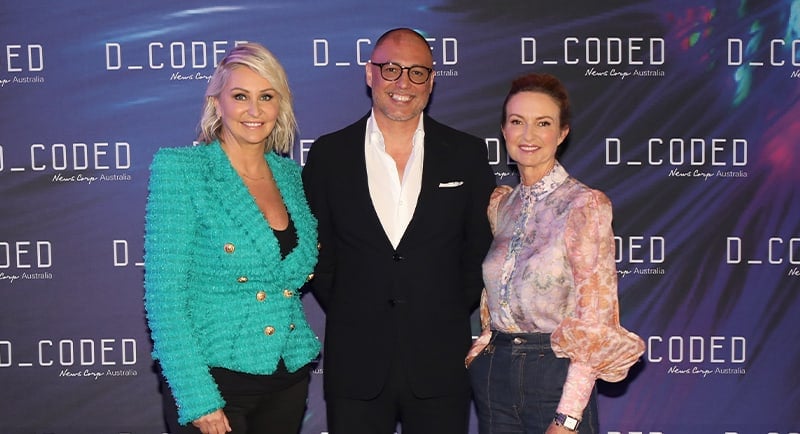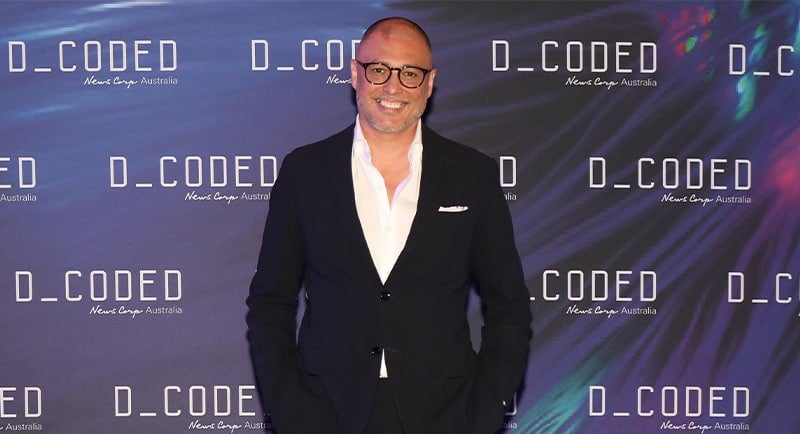On Monday, News Corp Australia unveiled a series of new innovations at its annual D_Coded event, held in Sydney’s Entertainment Quarter.
This was the company’s fifth digital marketing event for advertising, marketing, and media executives, with announcements covering new partnerships, new ways for people to buy, and a new total commerce offering.
The D_Coded presentation featured guest speaker, Quentin George, Partner and Leader: Commerce Media Practice at McKinsey & Company, USA. As the co-author of a McKinsey research paper Commerce Media: The New Force Transforming Advertising, George gave the audience insights into how media, commerce, technology, and marketing are converging into one industry.
Mediaweek caught up with George ahead of the D_Coded event to chat about marketing convergence and the state of the industry.
See Also: Content and commerce: Lou Barrett on the nuts and bolts of D_Coded 2023
See Also: The full funnel: Behind the D_Coded Total Commerce offering

Lou Barrett, Quentin George, Pippa Leary
How did you get involved with News Corp’s D_Coded? What made you say yes to speaking at the event?
“I was involved in the early days of programmatic. There’s a lot about commerce media that feels the same, because we’re trying to bring together supply and demand together on equal terms. A lot of that work is a little bit of evangelism to the industry, and I think McKinsey brings a relatively unique perspective, because we look across the whole value chain. I think we’re a relatively interesting voice to provide data to identify opportunities for people on both the supply and demand side.
“When I was introduced to these folks, I was curious to hear what they’ve been up to – I thought ‘oh, I’m doing a bit of work in that area, maybe I can help introduce the topic’.”
In your speech, you touch on how media, commerce, technology, and marketing are all converging into one area. Can you tell me a bit about what that means?
“For the last 100 years, all media was optimised around impressions – did I reach the audience that I said, I was going to reach? The logical next question is, what do you do about that? There’s a cottage industry of technology and services trying to do some educated guesswork to figure that out.
“Starting with Amazon about five or six years ago, they were really the first to connect impressions to SKU level sales. Once you do that, you start to realise the power of media and the ability for those things to be connected. Once you’ve done that, you ask ‘can’t we do that with everything?’.
“I think this has brought a broader push in the marketplace to get companies and specific retailers with commercial intent data, to be able to either build new businesses, but more importantly, allow content and media companies to connect their audiences to those SKU level sales. It creates opportunities for brand advertisers, it creates opportunities for retailers, and certainly creates opportunities for media companies.”
It sounds like there’s a lot of opportunity there, and quite a lot to dig into that marketers can make the most of.
“Not everyone is as progressive, but just like programmatic, it’s got a whiff of inevitability to it. I’ll be the first one to acknowledge there’s a substantial gap between the premise and the promise, and the reality of the experience today – but there’s no denying the underlying value of being able to tie transactions to impressions.”
It’s a bit of a weird time economically, what are some of your thoughts on how the industry is looking at the moment?
“I don’t think anybody knows what’s going to happen, but there are two types of brands. There are organisations that want to aggressively free up capital so that they can use it when times get tough, and they can apply it when they’ve got conviction or certainty around a particular set of strategies. But there are certainly a subset of clients that look at this from a very opportunistic perspective, because a lot of other brands retreat. This is possibly the best opportunity in the last 10 years, you can aggressively gain share if you play offence.”
Where do you think marketers should be focusing their attention over the next 12 months or so?
“I don’t think the job of the marketer has changed in 100 years, I think the tools have changed dramatically and the complexity has increased – but the fundamentals have not changed. In terms of what brands can and should do, they should spend a lot more time understanding what makes their product or service unique. I see a little bit of a pivot, the last 10 or 15 years have been so much about media efficiency and optimisation.
“If you were to spend an hour trying to improve the outcome for your campaign, you’re probably better served spending that hour on creative execution rather than on media execution. I guess it’s a good thing for media that we’re getting so good at it now, that it’s progressively sucks less! But I’m keen to see people return to taking a holistic view of media marketing.”
